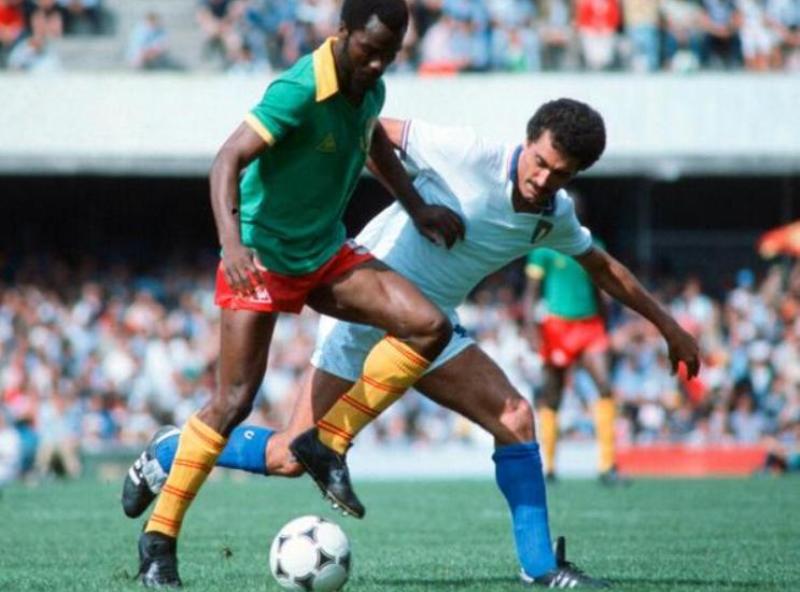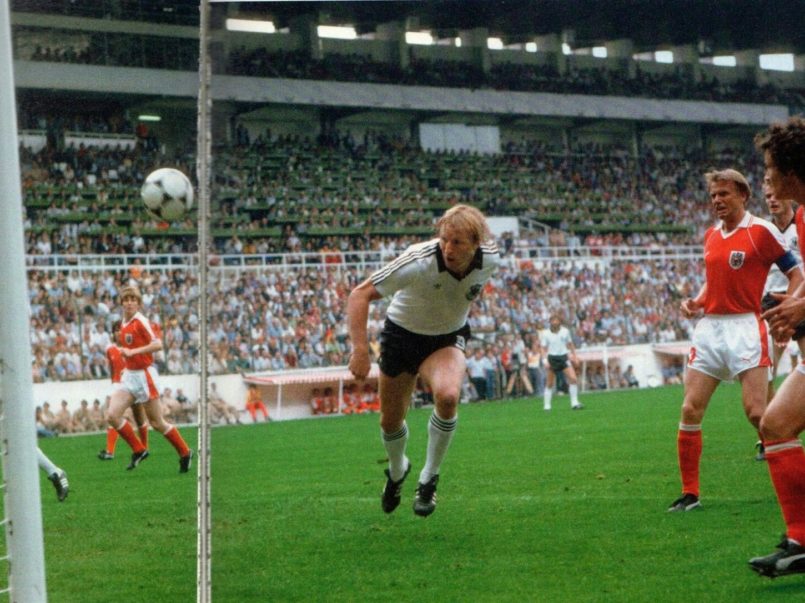According to the World Sports Encyclopaedia (2003), there are approximately 8000 indigenous sports or sporting games. But amongst the plethora of games, there is only one game known to us as the ‘The Beautiful Game’. Any guesses? Yes, it is football or soccer as we know it. With the advent of the 2022 FIFA World Cup qualifiers, we are about to witness the biggest game at the grandest stage and relive those wonderful moments again associated with the history of the FIFA World Cup. There have been incredible goals, assists, saves, comebacks, etc. that we have all witnessed in FIFA World Cups. But along with these great moments we have also witnessed some very contentious and controversial incidents during this age-old mega tournament that shook the world and left an indelible mark in our memories. Here is a list of the biggest controversies in FIFA World Cup’s history.
![]() Italy insulted the French crowd in 1938 FIFA World Cup
Italy insulted the French crowd in 1938 FIFA World Cup

It was in the 1938 World Cup in France just before World War II, Italy faced France in the quarter-finals of the tournament. Italy intentionally donned black shirt and pants on Mussolini’s orders, a symbol of the fascist movement, against their rivals France at their backyard.
This angered the French crowd as they were against the fascist movement in Italy. They were further infuriated after Italy did a fascist salute before eventually defeating France. Italy went on to win the World Cup.
![]() England’s goal against West Germany in the finals of 1966 FIFA World Cup
England’s goal against West Germany in the finals of 1966 FIFA World Cup

One of the most infamous and controversial incidents happened during the finals of the 1966 World Cup when Englishman Geoff Hurst’s shot hit the woodwork and ricochet down on the goal line. The Swiss referee was undecided and referred to the Soviet linesman named Bakhramov, who signaled it as a legitimate goal.
According to Bakhramov, the ball bounced off the net and not the crossbar and hence he signaled it as a goal. The German media and people cited bias by the Soviet linesman. To add to more controversy, when Bakhramov was asked about the controversial goal on his death bed, he only uttered the word ‘Stalingrad’, the name of the infamous city where the Nazis killed over 75,000 of Soviet soldiers during World War II.
![]() Bobby Moore’s bracelet saga in 1970 FIFA World Cup
Bobby Moore’s bracelet saga in 1970 FIFA World Cup

The England team’s preparation was hugely deterred during the 1970 FIFA World Cup when their captain Bobby Moore was allegedly involved in the theft of a diamond bracelet from a jeweler in Bogota, Colombia, where England went to play a warm-up match. Moore was accused of removing the bracelet from the hotel shop without paying.
He was harassed and was arrested by the Colombian police. British Prime Minister Harold Wilson had to intervene as Moore was put under four days of house arrest. Eventually, diplomatic pressure and lack of evidence acquitted Moore and he rejoined the English squad in Mexico for finals.
![]()
Peru connive with Argentina to oust Brazil in 1978 FIFA World Cup

During the 1978 World Cup held in Argentina, the second round of the tournament consisted of two different groups wherein the group winners eventually go on to play the finals of the World Cup. Brazil was at the top of the group due to a better goal difference. In the last round of matches, Argentina intentionally delayed the kick-off to know the outcome of Brazil versus Poland match result.
They knew that they needed 4 goals against Peru to topple the Brazilians and qualify for the finals. Argentina trounced Peru by 6 goals and rumors spread that the Peru team and especially the Peruvian goalkeeper who was born in Argentina aided them.
![]() Roger Milla’s disallowed goal helped Italy progress in 1982 FIFA World Cup
Roger Milla’s disallowed goal helped Italy progress in 1982 FIFA World Cup

We all know that Italy became the champions in the 1982 FIFA World Cup Spain. But in reality, they should have never qualified for the second round. They had been placed with Poland, Peru, and newcomers Cameroon in Group 1. Cameroon, in particular, had an outstanding tournament overall. They were undefeated and could have easily topped the group if Roger Milla’s brilliant solo goal against Peru had been not ridiculously disallowed for reason unknown.
It was such a shameful decision by the Austrian referee Franz Wohrer. The Peru-Cameroon match ended in a goalless draw. Italy and Cameroon had the same points but the former scrapped passed having scored just one more goal in the group stages.
![]() Schumacher’s outrageous foul on Battiston in 1982 FIFA World Cup
Schumacher’s outrageous foul on Battiston in 1982 FIFA World Cup

The semifinal of the 1982 World Cup between West Germany and France in Seville, Spain still haunts many not because of the outcome of the match where the former scrapped past in a tense penalty shoot-out, but because of a disgraceful and atrocious foul in the history of the tournament. When French captain Michel Platini fed a gorgeous looping pass for teammate Patrick Battiston, the onrushing West German goalkeeper Toni Schumacher brutally fouled the latter with his hip and shoulder.
The foul was so severe that Battiston was left unconscious for almost thirty minutes with three teeth knocked out and damaged vertebrae. Surprisingly the Dutch referee did not even give a foul and gave a goal kick instead. Schumacher shamelessly resumed play and showed no penitence. This incident is still referred to as the ‘tragedy of Seville’.
![]() West Germany and Austria’s conspiracy sent the valiant Algerians home in 1982 FIFA World Cup
West Germany and Austria’s conspiracy sent the valiant Algerians home in 1982 FIFA World Cup

Algerians displayed the performance of their lives in their maiden FIFA World Cup in 1982 held in Spain. They defeated the mighty West Germans and came extremely close to qualification for the next group stage. As the final leg matches were played at different times, West Germany and Austria knew that a 1-0 win would be enough for both the teams to qualify and oust the Algerians.
During the match, the West Germans scored an early goal only for the spectators to see the entire match turn to a mere slow passing game wherein both teams were seen intentionally not attacking each other’s goal. Eventually, the game ended in a 1-0 defeat to the Austrians, but due to superior goal difference both the teams advanced. Algerians lodged a complaint with FIFA but no actions were taken against the accused teams. Till today, this match is referred to as the ‘worst match in FIFA World Cup’s history’ or the ‘Disgrace of Gijon’.
![]() Maradona’s ‘The Hand of God’ in 1986 FIFA World Cup
Maradona’s ‘The Hand of God’ in 1986 FIFA World Cup

In the quarter-finals of the 1986 World Cup, England faced Argentina. In the 51st minute of the game, Diego Maradona leaped in the air above English goalkeeper Peter Shilton (who stood a clear 8 inches taller than him) and tapped the ball in with his left hand and scored.
It was pretty evident that Maradona scored the goal with his hand. England players appealed but in vain. Argentina went on to win the tie 2-1. Later when asked about the goal Maradona replied, “a little with the head of Maradona and a little with the hand of God”, after which the goal was named as the ‘Hand of God’ goal.
![]() Josip Šimunić’s three yellow cards by English referee in 2006 FIFA World Cup
Josip Šimunić’s three yellow cards by English referee in 2006 FIFA World Cup

In the 2006 FIFA World Cup in Germany, Croatia faced Australia in a group leg match. Renowned English referee Graham Poll was in charge of this crucial encounter. Graham Poll failed to record properly the first yellow card caution of Croatia’s Josip Simunic and forgot to send him off after a double yellow card booking.
Eventually, when Simunic was booked for the third time, he was given the marching orders. As a result of this gaffe, Poll never again officiated a FIFA World Cup match.
![]() The French revolt in 2010 FIFA World Cup
The French revolt in 2010 FIFA World Cup 
In the 2010 World Cup in South Africa, French coach Raymond Domenech faced the ultimate humiliation when the team refused to train in protest against the French Football Federation’s (FFF) decision to send home an unruly Nicholas Anelka. In Group A, France managed a draw against Uruguay in their first match but lost the second group match to Mexico. During the lemon break of Mexico match, Nicholas Anelka abused the Coach after an altercation. Anelka was sent back home the next day by FFF.
French captain Patrice Evra protested the decision and declined to train. Media immediately made things public. Team director, Jean Louis Valentin resigned after the incident. The French Sports Minister jumped in the scene in order to resolve the situation and circumvent further embarrassment of the national team. To add insult to injury, France lost the last group match to host South Africa and were sent home packing.


